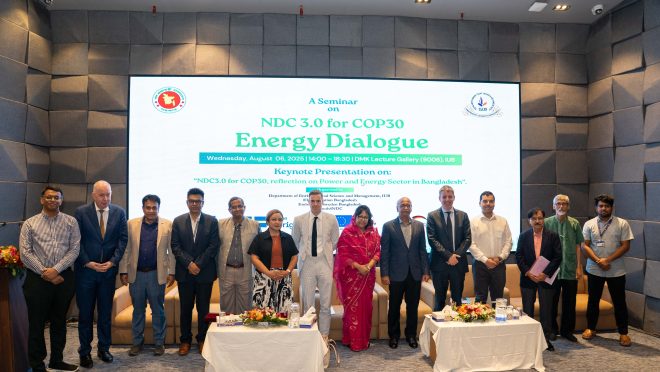IUB hosts dialogue on NDC3.0 and energy transition ahead of COP30
IUB hosts dialogue on NDC3.0 and energy transition ahead of COP30

The Department of Environmental Science and Management (DESM) at Independent University, Bangladesh (IUB) organised a high-level dialogue titled “NDC3.0 for COP30 – Energy Dialogue” on 6 August 2025. The event convened policymakers, academics, development partners, and youth representatives to deliberate on the critical role of Bangladesh’s energy sector in shaping the country’s third Nationally Determined Contributions (NDC3.0), ahead of the COP30 summit in Brazil next year.
The dialogue was hosted at the DMK Lecture Gallery on the IUB campus and jointly organised by the Embassy of Sweden in Bangladesh, the Delegation of the European Union to Bangladesh, GIZ, and Youth for NDCs.
Under the Paris Agreement, NDCs serve as national climate action plans that set out targets for reducing greenhouse gas emissions and adapting to climate change. Bangladesh is currently preparing its third submission, with the energy sector identified as a key driver for emissions reduction and sustainable transformation.
The session began with a welcome address from Professor Dr Md Hafizur Rahman, Head of the Department of Environmental Science and Management at IUB. Dr Farhina Ahmed, Secretary to the Ministry of Environment, Forest and Climate Change, was present as Special Guest. Distinguished speakers included His Excellency Mr Nicolas Weeks, Ambassador of Sweden to Bangladesh; Dr Bernd Spanier, Chargé d’affaires of the EU Delegation; and Professor M Tamim, Vice Chancellor of IUB.
In her remarks, Secretary Dr Ahmed stated that the government’s priorities include economic development and securing the basic rights of the people, as survival remains paramount. She noted that although Bangladesh contributes only 0.5 percent to global emissions, its high climate vulnerability necessitates a dual focus on both mitigation and adaptation. As a signatory to the Sustainable Development Goals, Bangladesh is committed to achieving balanced development while caring for the planet.
Ambassador Weeks highlighted that energy remains central to meeting climate commitments. He reiterated Sweden’s commitment as a major donor to climate action, supporting both emission reduction and adaptation measures through effective cooperation.
Dr Spanier stressed that the energy transition must reflect the aspirations of young people who did not cause the climate crisis but are its most vulnerable stakeholders. Reflecting on recent climate events, including record temperatures and devastating floods in Bangladesh, he commended the resilience and leadership emerging from local communities.
Professor Tamim underscored the importance of energy efficiency in reducing carbon emissions. He called for youth-led innovation and advocated for the adoption of inverter-based appliances, which can reduce electricity consumption by up to 50 percent. He also suggested that government incentives for efficient technologies could lead to significant national impact.
The dialogue featured a panel discussion with Professor Rezwan Khan, Chairman of Power Grid Company of Bangladesh; Professor Dr Ahmed Badruzzaman from the University of California, Berkeley; Nayoka Martinez-Bäckström, First Secretary for Environment and Climate Change at the Embassy of Sweden; Dr K Ayaz Rabbani, Dean of the School of Environment and Life Sciences at IUB; Professor Dr Md Hafizur Rahman, Head of DESM at IUB; Nazmul Haque, Chief Investment Officer at IDCOL; and Fyaj Khan Anam, Community Manager of Youth for NDCs.
Following the panel, Dr Khondaker Golam Moazzem, Research Director at the Centre for Policy Dialogue (CPD), delivered a keynote presentation titled “NDC3.0: Reflections on Power and Energy Sectors in Bangladesh.”
The session was moderated by Shaikh Muhammad Mehedi Ahsan, Assistant Professor (Adjunct) at DESM. The programme concluded with a cultural performance by popular artist Critical Mahmood.


